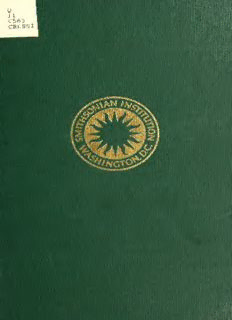
United States National Museum PDF
Preview United States National Museum
SMITHSONIAN INSTITUTION MUSEUM O F NATURAL HISTORY UNITED STATES NATIONAL MUSEUM BULLETIN 278 The Caprellidae Amphipoda) (Crustacea: of the Western North Atlantic JOHN McCain c. Research Associate, Department of Oceanography, Oregon State University SMITHSONIAN INSTITUTION PRESS WASHINGTON, D.C. 1968 Publications of the United States National Museum The scientific publications of the United States National Museum include two series, Proceedings of the United States National Museum and United States National Museum Bulletin. In these series are published original articles and monographs dealing with the collections and work of the Museum and setting forth newly acquired facts in the field of anthropology, biology, geology, history, and technology. Copies of each publication are distributed to libraries and scientific organizations and to specialists and others interested in the various subjects. The Proceedings, begun in 1878, are intended for the publication, in separate form, of shorter papers. These are gathered in volumes, octavo in size, with thepublication date ofeachpaperrecordedinthe table ofcontents ofthe volume. In the Bulletin series, the first of which was issued in 1875, appear longer, separate publications consisting of monographs (occasionally in several parts) and volumes in which are collected works on related subjects. Bulletins are either octavo or quarto in size, depending on the needs of the presentation. Since 1902, papers relating to the botanical collections of the Museum have been published in the Bulletin series under the heading Contributions from the United States National Herbarium. This work forms number 278 of the Bulletinseries. Frank A. Taylor Director, United States National Museum U. S. GOVERNMENT PRINTING OFFICE WASHINGTON: 1968 ForsalebytheSuperintendentofDocuments, U.S. Government Printing Ofllce Washington,D.O.20402-Price70cents(papercover) 1 Contents Page Acknowledgments vi Introduction 1 Taxonomic section 2 Taxonomic characters 2 Illustrations and measurements 6 Key to the Caprellidae of the western North Atlantic 6 Aeginella spinosa Boeck (figs. 2, 3, 54) 8 Aeginina longicornis (Kr03'er) (figs. 4-7, 54) 13 Caprella andreae Mayer, new rank (figs. 8, 9, 55) 19 Caprella bermudia Kimkcl 22 Caprella danilcvskii Czerniavski (figs. 10, 11, 55) 22 Caprella equilibra Say (figs. 12, 13, 55) 25 Caprella linearis (Linnaeus) (figs. 14, 22, 51) 30 Caprella longimanus Stimpson 33 Caprella penantis Leach (figs. 15, 16, 51) 33 Caprella sanguinea Gould 40 Caprella scaura Templeton (figs. 17, 18, 55) 40 Caprella septentrionalis Kr0yer (figs. 19-22, 51) 44 Caprella unica Mayer (figs. 23, 24, 55) 49 Deutella californica Mayer (fig. 52) 54 Deutella mayeri Stebbing (figs. 25, 26, 52) 54 Fallotriiella biscaynensis, new genus, new species (figs. 27, 28, 53) 58 Heniiaegina minula Mayer (figs. 29, 30, 50) 61 Hemiproto wigleyi, new genus, new species (figs. 31, 32c-e, 50) 65 Luconacia incerta Mayer (figs. 33-35, 52) 68 Mayerella limicola Huntsman (figs. 36, 50) 73 Maycrellaredunca, newspecies (figs. 37, 38, 50) 75 Meiaprotclla hummelincki, new species (figs. 39, 40, 50) 78 Paracaprella pusilla Mayer (figs. 32a-b, 41, 42, 53) 82 Paracaprella tenuis Mayer (figs. 43, 44, 53) 86 Pariambus typicus f. cumana Mayer 89 Phtisica antillensis (Mayer) (figs. 45, 54) 89 Phtisica marina Slabber (figs. 46, 47, 54, 56) 90 Proaeginina norvegica (Stephensen) (figs. 48, 54) 97 Pseudaeginella antiguae Barnard 100 Ecology 100 Zoogeography 10 Relationship between the amphipod suborders Gammaridea and Caprel- lidea 107 Literature cited 112 V Acknowledgments I am indebted to many persons for study material of caprellids; to them I offer my sincere gratitude. In particular I should like to thank Dr. Torben Wolff (Universitetets Zoologiske Museum, Copen- hagen) for lending me many of Mayer's types, without which the value of this paper would be greatly diminished. I am grateful to Dr. Roland Wigley (Bureau of Commercial Fisheries Laboratory, Woods Hole) for the use of his caprelUd collections by the R,V Gosnold from the entire Atlantic coast of the United States. These provided invaluable information on the distribution of many species and contributed several newrecords and a new genus. To Dr. P. Wagenaar HummeUnck (Zoologisch Laboratorium, Utrecht) special thanks are due for making available his collection of the virtually unstudied West Indian capreUids. Dr. E. L. Bousfield (National Museum of Canada, Ottawa) has aided a great deal by lending me his collection from the Atlantic coast of the United States and by making helpful suggestions diu*ing this research. Drs. T. E. BowTiian, H. H. Hobbs, Jr., and F. A. Chace, Jr. of the Division of Crustacea at the Smithsonian Institution were es- pecially helpful by reviewing the manuscript and acting as members of my consultative committee at The George Washington University. This study was made possible by a grant from the Smithsonian Institution Research Foundation and by a grant-in-aid-of-research from the Society of Sigma Xi. VI
Description: